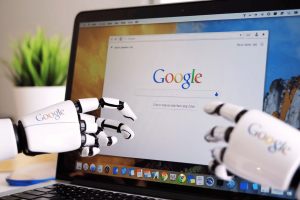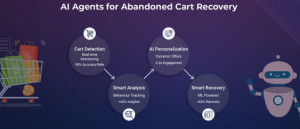The Transformative Role of AI in Digital Marketing
In today’s digital-first landscape, artificial intelligence (AI) is revolutionizing how brands connect with consumers. From personalized recommendations to automated campaigns and predictive analytics, AI is transforming digital marketing into a more data-driven, efficient, and customer-focused practice. As technology continues to evolve, understanding the role of AI in digital marketing has become essential for businesses looking to stay competitive.
What is AI in Digital Marketing?
Artificial intelligence refers to machines and software mimicking human intelligence to perform tasks such as learning, problem-solving, and decision-making. In the realm of digital marketing, AI powers everything from customer segmentation and content creation to chatbots and campaign optimization. The use of AI enhances marketing strategies by enabling real-time data analysis and personalized experiences that drive engagement and conversions.

Why AI is Revolutionizing Digital Marketing
1. Hyper-Personalization
One of the most significant benefits of AI in digital marketing is the ability to deliver hyper-personalized content. AI algorithms analyze data from user behavior, purchase history, demographics, and browsing patterns to create highly personalized experiences. This means users receive relevant product recommendations, targeted ads, and content that resonates with their needs.
Example: Netflix and Amazon use AI to suggest shows and products based on individual preferences, significantly increasing user engagement and retention.
2. Automated Customer Service with AI Chatbots
AI-powered chatbots have become an essential tool in modern customer service strategies. Available 24/7, these bots can handle inquiries, provide product recommendations, and resolve issues in real time without human intervention.
SEO Tip: Keywords like AI chatbots for customer service, automated support, and 24/7 virtual assistant help boost search rankings for service-related topics.
3. Data-Driven Marketing Decisions
With access to vast amounts of data, marketers often struggle to extract meaningful insights manually. AI steps in by automating data collection, analysis, and interpretation, providing actionable insights for campaign performance, customer behavior, and market trends.
Tools: Google Analytics, Adobe Sensei, and HubSpot use AI to help marketers track campaign success and customer journey paths.
4. Content Creation and Optimization
AI tools can now generate compelling blog posts, social media content, product descriptions, and even video scripts. Platforms like Jasper (formerly Jarvis) and Copy.ai use natural language processing (NLP) to write content that ranks well on search engines.
SEO Integration: AI helps marketers identify relevant keywords, optimize meta descriptions, and suggest content structures that align with Google’s ranking algorithms.
5. Predictive Analytics for Better Targeting
Predictive analytics powered by AI can anticipate consumer behavior, allowing marketers to target prospects before they take action. This proactive approach increases the chances of converting leads into paying customers.
Use Case: E-commerce brands use AI to predict when a customer is likely to abandon a cart and automatically send follow-up emails or discounts to complete the purchase.

Key Applications of AI in Digital Marketing
Let’s explore some popular AI applications that are reshaping the digital marketing space:
– AI-Powered Email Marketing
AI can analyze customer behavior and send automated, personalized email campaigns at the right time. By using dynamic content and subject line optimization, brands can improve open rates and CTRs significantly.
– Voice Search Optimization
With the rise of smart assistants like Alexa, Siri, and Google Assistant, optimizing for voice search is crucial. AI helps identify conversational keywords and create content that aligns with voice queries.
SEO Tip: Use long-tail keywords and question-based queries such as “What’s the best AI tool for marketers?” to capture voice search traffic.
– Visual Recognition and Targeted Ads
AI can scan and analyze images, enabling more accurate visual content recommendations and ad targeting. For example, platforms like Pinterest use AI to serve visually similar products based on user preferences.
– Programmatic Advertising
AI automates the ad buying process in real-time to place the right ad in front of the right user. This not only saves time but also ensures higher ROI by targeting the most relevant audiences.
Benefits of Using AI in Your Digital Marketing Strategy
-
Increased Efficiency: Automating repetitive tasks like A/B testing, reporting, and scheduling saves valuable time.
-
Improved ROI: Targeted campaigns mean better conversion rates and reduced ad spend waste.
-
Better Customer Experience: Personalized content, faster responses, and smarter recommendations enhance overall satisfaction.
-
Competitive Edge: Businesses using AI tools are more agile and capable of responding to market trends faster.
How to Implement AI in Your Marketing Strategy
-
Identify Pain Points: Determine which marketing tasks are time-consuming or inefficient.
-
Choose the Right Tools: Use AI-powered platforms like Salesforce Einstein, Marketo, or SEMrush for analytics, lead scoring, and SEO.
-
Start Small: Begin with one aspect of AI, such as chatbots or automated email campaigns, and scale gradually.
-
Train Your Team: Ensure your team understands how to use these tools effectively for better adoption and results.
-
Monitor & Optimize: Continuously analyze performance and refine your strategy based on AI-driven insights.
SEO Best Practices When Using AI Tools
To maximize visibility and traffic, here are some SEO tips to follow:
-
Focus on Intent: Use AI keyword tools to identify what users are actually searching for, not just generic keywords.
-
Optimize for Mobile and Voice: AI can analyze mobile behavior and voice search trends to guide your content strategy.
-
Use Structured Data: Implement schema markup to help search engines understand your content better.
-
Leverage AI Tools for SEO: Tools like Surfer SEO, Clear scope, and Market Muse use AI to optimize content structure and keyword density.
Future Trends: What’s Next for AI in Digital Marketing?
-
AI-Powered Video Marketing: Tools will soon generate entire video campaigns based on simple prompts or scripts.
-
Emotion AI (Affective Computing): Marketers will use AI to read emotions and tailor messages accordingly.
-
Zero-Click Searches: AI helps optimize content for snippets and featured results, reducing the need for clicks.
-
AI-Driven Influencer Marketing: Advanced tools will match brands with the perfect influencers using engagement analytics.
Final Thoughts
AI in digital marketing is no longer a luxury—it’s a necessity. As the technology matures, it will continue to evolve how we understand customers, optimize campaigns, and achieve measurable results. Whether you’re a small business owner or a large enterprise, integrating AI into your digital strategy can offer the insights, efficiency, and personalization you need to succeed in an increasingly competitive online world.
If you’re not already using AI in your digital marketing strategy, now is the time to start.
